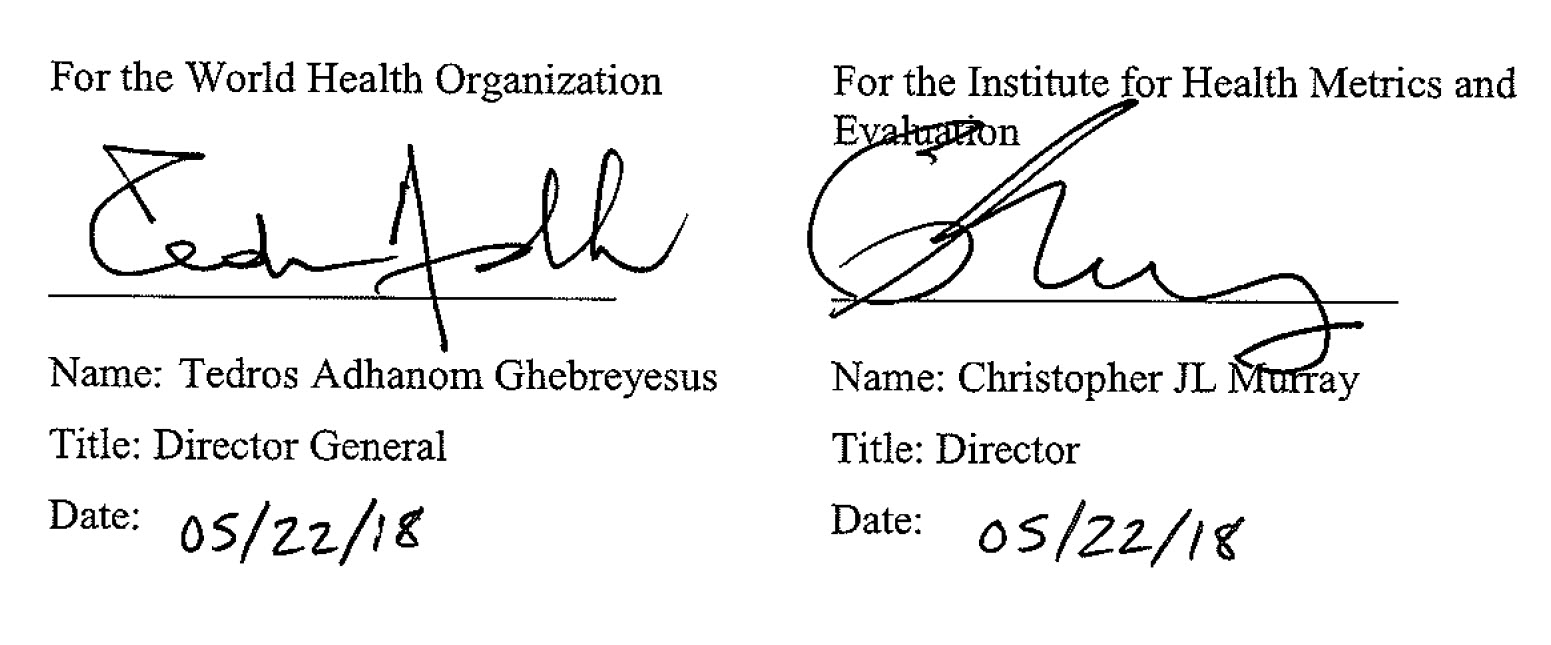WHO and IHME collaborate to improve health data globally
Published May 22, 2018
The World Health Organization and the Institute for Health Metrics and Evaluation (IHME) have formally agreed to collaborate in improving the accuracy, timeliness, and policy-relevance of health data. A memorandum of understanding (MOU) signed today will result in increased awareness and understanding of health problems globally, as well as the evaluation of strategies to address them.
GENEVA – The World Health Organization and the Institute for Health Metrics and Evaluation (IHME) have formally agreed to collaborate in improving the accuracy, timeliness, and policy-relevance of health data. A memorandum of understanding (MOU) signed today will result in increased awareness and understanding of health problems globally, as well as the evaluation of strategies to address them.
“This new agreement highlights our shared commitment to ensure that health policy is based on the most accurate and up-to-date data available,” said WHO Director-General Dr. Tedros Adhanom Ghebreyesus.
“By integrating our two organizations’ knowledge and expertise, we are embarking on an unprecedented and unparalleled journey to improve health systems and, in turn, the health and well-being of people throughout the world,” said Dr. Christopher Murray, director of IHME, which is affiliated with the University of Washington in Seattle.
The agreement calls for both organizations to work together on the annual Global Burden of Disease study, thereby strengthening the study for national and local decision-making by health officials and practitioners. It will raise the quality and use of health metrics science at the global, regional, national, and subnational levels for health indicators. This work includes, but is not limited to:
- Estimates of total and cause-specific mortality;
- Incidence and prevalence of diseases and injuries; and
- The burden of disease and health determinants, such as exposure to risk factors or intervention coverage.
WHO and IHME will also increase the capacity of countries to review, assess, and improve national health data systems, analysis, and reporting. They will help countries identify and assess strategies to close gaps in health data. The two organizations plan to facilitate the use of health estimates for decision-making through policy dialogue and equip policymakers with superior tools for decision-making.
It is an opportunity to make the most of WHO’s ability to convene global expertise and engage with countries. It is also an opportunity to involve individuals not currently involved, identify new directions for data collection and analysis, and enhance the exchange of information and data to strengthen Global Burden of Disease analysis.
“Beginning today, we will expand and enhance significantly IHME’s overarching objective to create the most complete and up-to-date roadmap helping policymakers determine how best to help people live longer, healthier lives,” said Dr. Murray.
The Global Burden of Disease is produced by a global network of more than 3,150 collaborators from more than 1,100 universities, research centers, and government units, the majority of which are in low- and middle-income countries. The current study, which will be published later this year, covers 195 countries and territories, with subnational assessments for 16 countries, calculated for each year since 1990. It assesses 355 diseases and injuries, 2,982 conditions resulting from these diseases and injuries, and 89 risk factors or combinations of risks.
Moving forward, both leaders said they are committed to the open release of all results, as well as to transparency on sources and to posting of all analytical code leading to the study’s findings.

Media contacts:
About the Institute for Health Metrics and Evaluation
The Institute for Health Metrics and Evaluation (IHME) is an independent global health research organization at the University of Washington that provides rigorous and comparable measurement of the world’s most important health problems and evaluates the strategies used to address them. IHME makes this information widely available so that policymakers have the evidence they need to make informed decisions about how to allocate resources to improve population health.